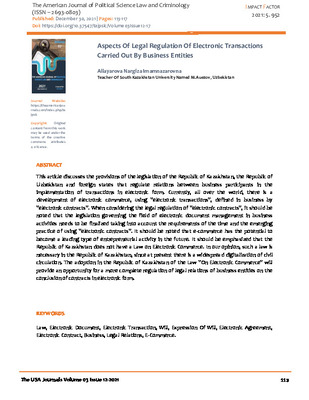Aspects Of Legal Regulation Of Electronic Transactions Carried Out By Business Entities
Abstract
This article discusses the provisions of the legislation of the Republic of Kazakhstan, the Republic of Uzbekistan and foreign states that regulate relations between business participants in the implementation of transactions in electronic form. Currently, all over the world, there is a development of electronic commerce, using "electronic transactions", defined in business by "electronic contracts". When considering the legal regulation of "electronic contracts", it should be noted that the legislation governing the field of electronic document management in business activities needs to be finalized taking into account the requirements of the time and the emerging practice of using "electronic contracts". It should be noted that e-commerce has the potential to become a leading type of entrepreneurial activity in the future. It should be emphasized that the Republic of Kazakhstan does not have a Law on Electronic Commerce. In our opinion, such a law is necessary in the Republic of Kazakhstan, since at present there is a widespread digitalization of civil circulation. The adoption in the Republic of Kazakhstan of the Law "On Electronic Commerce" will provide an opportunity for a more complete regulation of legal relations of business entities on the conclusion of contracts in electronic form.

Downloads
Teacher

Keywords:
Abstract
This article discusses the provisions of the legislation of the Republic of Kazakhstan, the Republic of Uzbekistan and foreign states that regulate relations between business participants in the implementation of transactions in electronic form. Currently, all over the world, there is a development of electronic commerce, using "electronic transactions", defined in business by "electronic contracts". When considering the legal regulation of "electronic contracts", it should be noted that the legislation governing the field of electronic document management in business activities needs to be finalized taking into account the requirements of the time and the emerging practice of using "electronic contracts". It should be noted that e-commerce has the potential to become a leading type of entrepreneurial activity in the future. It should be emphasized that the Republic of Kazakhstan does not have a Law on Electronic Commerce. In our opinion, such a law is necessary in the Republic of Kazakhstan, since at present there is a widespread digitalization of civil circulation. The adoption in the Republic of Kazakhstan of the Law "On Electronic Commerce" will provide an opportunity for a more complete regulation of legal relations of business entities on the conclusion of contracts in electronic form.
References
International law. Textbook. / Otv. ed. Yu.M. Kolosov, V.I. Kuznetsov. M., 1994.- P.441.
Krasavchikov O.A. The theory of legal facts in Soviet civil law: Abstract of the dissertation of the candidate of legal sciences. Sverdlovsk, 1950.- p. 10.
Kheifets F.S. Invalidity of transactions under Russian civil law. M., 2000.- p. 8.
Civil Code of the Republic of Kazakhstan (General Part), adopted by the Supreme Council of the Republic of Kazakhstan on December 27, 1994 https://online.zakon.kz/document/?doc_id=1006061&doc_id2=1006061#activate_doc=2&pos=220;-98&pos2=1988;-98 (date of access: 20.03.2020).
Civil Code of the Republic of Uzbekistan (Part One) (approved by the Law of the Republic of Uzbekistan dated December 21, 1995 No. 163-I) https://online.zakon.kz/document/?doc_id = 30421270 & doc_id2 = 30421270 # activate_doc = 2 & pos = 49; -80 & pos2 = 815; -88 (date accessed: 03/20/2020).
Shamraev A. V. Legal regulation of information technologies (analysis of problems and basic documents). Version 1.0. M .: "Statut", "Intertech", "BDC-press", 2003. -P.273.
Boguslavsky M.M. International private law. Textbook. M., 2004.- p. 258.
Law of the Republic of Uzbekistan dated May 22, 2015 No. ЗРУ-385 "On electronic commerce" https://online.zakon.kz/document/?doc_id=39091913#pos= 16;- 58 (date of access: 21.03.2020).





